Africa/Nigeria/universityworldnews
Una nueva universidad militar enfocada en tecnología nuclear se ubicará en la ciudad de Biu, en el estado de Borno, una zona rica en uranio y el epicentro de la insurgencia de Boko Haram, que ha devastado el país durante los últimos ocho años. Si bien la nueva institución estará abierta a los civiles, no todos están de acuerdo en que Nigeria necesita otra universidad militar.
La nueva universidad -la institución militar de segundo grado en Nigeria después de la Academia de Defensa de Nigeria, establecida en 1964- también contará con una escuela ambiental, un centro de biotecnología, un sitio de evaluación para equipamiento militar y ofrecerá cursos sobre ciberseguridad y recopilación de inteligencia . La aprobación para la institución fue otorgada por el Consejo Ejecutivo Federal el 11 de abril.
El Jefe del Estado Mayor del Ejército, Tukur Yusuf Buratai, dijo que la nueva universidad iría más allá del papel de una institución de entrenamiento profesional para el personal militar.
«El ejército nigeriano de hoy no puede permitirse permanecer estático y, por lo tanto, debe explorar los campos de la ciencia, la ingeniería e incluso las humanidades», dijo Buratai.
Buratai dijo que la ubicación de la nueva universidad sería buena para exhibiciones inter-balísticas y la producción de equipos de laboratorio. También proporcionaría una apariencia de presencia militar a las comunidades que aún se están recuperando de los efectos de las insurgencias de Boko Haram.
El presidente del Comité de Planificación e Implementación de la Universidad, Major General (Rtd) Mathias Efeovbokhan, dijo que la universidad acomodaría al 75% de civiles y al 25% del personal militar (debido a exigencias operativas) y agregó que era necesario entrenar a militares y civiles para promover una relación cordial que beneficiaría al país y resolvería sus numerosos desafíos de seguridad.
Dijo que la universidad ofrecería servicios similares a Silicon Valley en los Estados Unidos cuando estén en pleno funcionamiento y que ya se están desarrollando estrategias para garantizar la sostenibilidad de la nueva institución. Entre una «variedad de empresas generadoras de ingresos» se encontraba un proyecto de granja solar con 300-400 árboles que consistía en árboles de neem, goma arábiga y algodón que ofrecerían algunas oportunidades de empleo.
El profesor Abubakar Rasheed, secretario ejecutivo de la Comisión Nacional de Universidades (NUC), dijo que la nueva Universidad del Ejército de Nigeria servirá al país como un centro de estudios de ingeniería, ciencia y tecnología.
Según Rasheed, la universidad proporcionará una de las plataformas más críticas del país para los ciudadanos y las interacciones militares y para la lluvia de ideas de soluciones a los desafíos nacionales.
«Nosotros en NUC estamos entusiasmados de que la universidad del ejército no sea exclusivamente para los militares, sino que atenderá a toda la sociedad. Esto conducirá al avance del conocimiento. Cuando las personas de todos los estratos participen en la generación de investigación en la universidad, habrá una cosecha de conocimiento que tendrá un impacto positivo en el desarrollo de la nación «, dijo.
El ex ministro de ciencia y tecnología, el profesor Turner Isoun, criticó la ubicación de la universidad en Biu y su enfoque en la tecnología nuclear para aprovechar el uranio de la zona.
Isoun dijo que la capacidad de realizar investigaciones de calidad y no la disponibilidad de materias primas debería ser el factor más importante detrás de la elección de un sitio.
«Si la razón para ubicar a la universidad en el área es debido a la disponibilidad de uranio, entonces nos hemos equivocado en nuestra planificación. La Universidad Ahmadu Bello (ABU) y la Universidad Obafemi Awolowo (OUA) tienen reactores de investigación, y la Comisión de Energía Atómica de Nigeria (CEAN) existe desde hace 15 años. Si una universidad se va a enfocar en la tecnología nuclear en el país, es importante que tal instituto colabore con ABU, OAU y NAEC para aprovechar la capacidad humana disponible que ya existe allí «, dijo.
El motivo de la creación de la nueva universidad y su ubicación son objeto de cierto debate, especialmente porque el propio jefe de los militares es oriundo de la provincia del Nordeste, donde se ubicará la nueva universidad.
El Dr. Ogbonnaya Pius, un educador, dijo que la decisión de establecer universidades y dónde ubicarlas a menudo no estaba motivada por la necesidad de propagar conocimiento, sino que era parte de una «mentalidad nacional» que afligía a aquellos en el poder que los ubicaban en proyectos nacionales «en sus propios patios traseros «.
«Tenemos la NDA [Academia de Defensa de Nigeria] que ha existido durante varias décadas otorgando títulos de licenciatura y posgrado y alrededor de 200 universidades en el país. Sin embargo, estamos estableciendo otra universidad en lugar de mejorar las ya existentes que no son competitivas a nivel mundial «, dijo.
A medida que la sociedad debate la conveniencia o no de la universidad militar, la armada y la fuerza aérea nigerianas ya han presentado sus solicitudes al NUC solicitando permiso para establecer sus propias universidades. Es probable que la tendencia continúe, ya que todos los equipos paramilitares, como el Servicio de Aduanas de Nigeria, el Servicio de Inmigración de Nigeria y el Cuerpo de Seguridad y Defensa Civil de Nigeria, pueden establecer sus propias universidades, como es actualmente permitido para todas las organizaciones religiosas y culturales del país.
Fuente: http://www.universityworldnews.com/article.php?story=20180510085802535
Imagen tomada de: http://www.onlinenigeria.com/site/wp-content/uploads/army-university-the-vision-and-geography-by-bukar-raheem.jpg
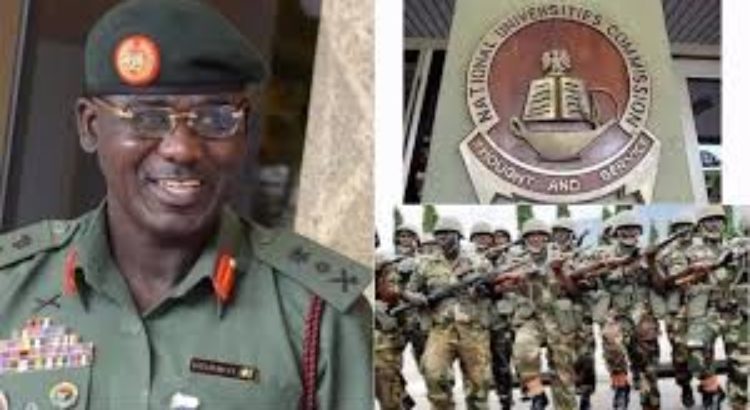
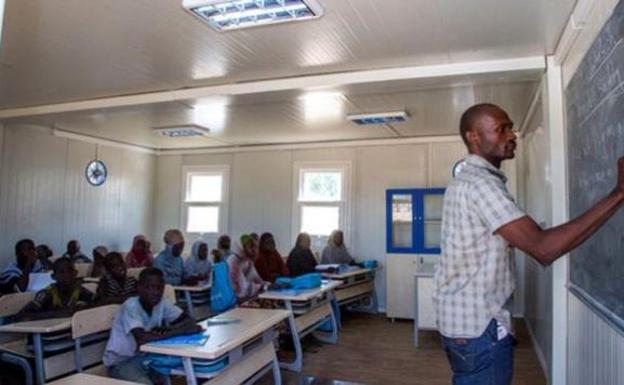
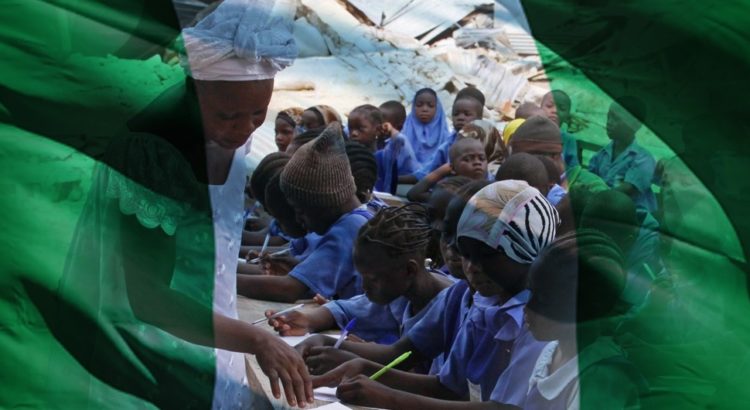
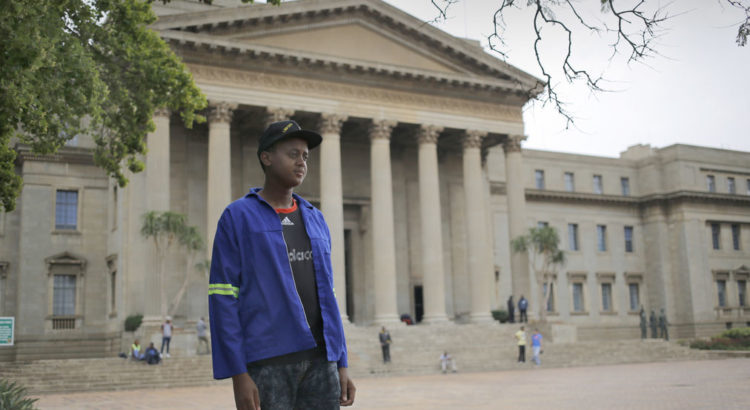
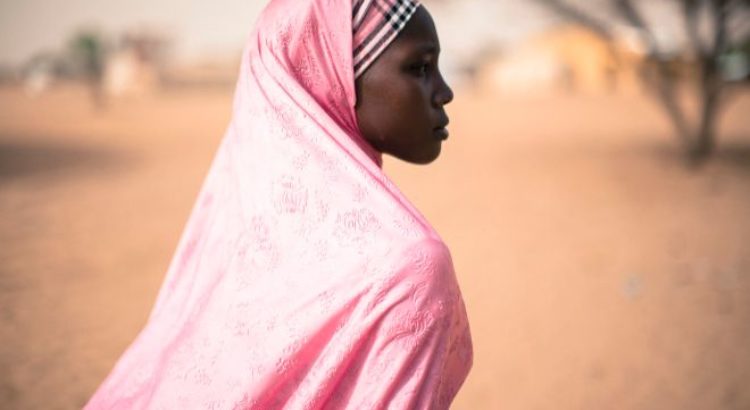

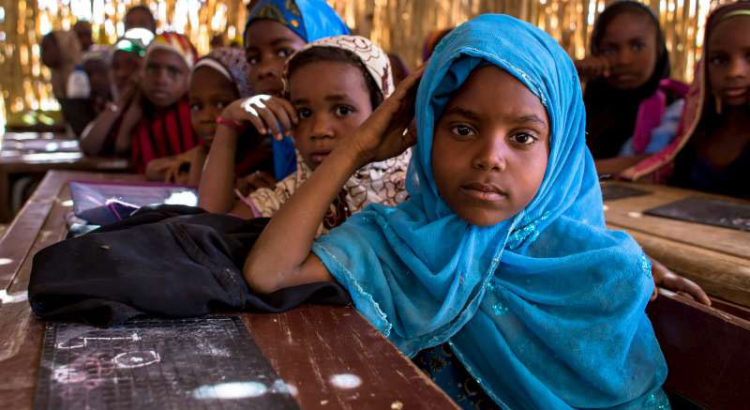






 Users Today : 67
Users Today : 67 Total Users : 35460084
Total Users : 35460084 Views Today : 85
Views Today : 85 Total views : 3418716
Total views : 3418716